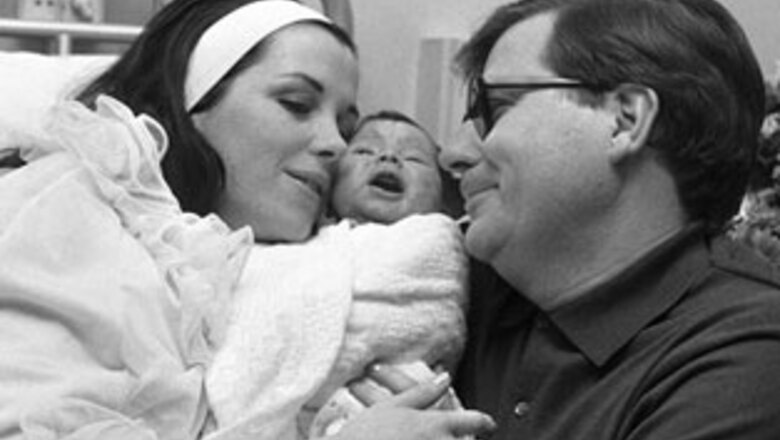
views
London: He spent his life conducting world-renowned orchestras, but was almost blind and growing deaf — the music he loved increasingly out of reach. His wife of 54 years had been diagnosed with terminal cancer. So Edward and Joan Downes decided to die together.
UK music conductor Sir Edward Downes (since he was knighted by Queen Elizabeth II in 1991) and his wife ended their lives last week at a Zurich clinic run by the assisted suicide group Dignitas. They drank a small amount of clear liquid and died hand-in-hand, their two adult children by their side. He was 85 and she was 74.
The deaths were a poignant coda to Edward Downes' illustrious musical career, and have reignited a debate in Britain about whether people should be able to help ailing loved ones end their lives.
The couple's children said Tuesday that they died "peacefully and under circumstances of their own choosing" on Friday.
"After 54 happy years together, they decided to end their own lives rather than continue to struggle with serious health problems," said a statement from the couple's son and daughter, Caractacus and Boudicca.
"They wanted to be next to each other when they died," Caractacus Downes told London's Evening Standard newspaper. "They held hands across the beds.
"It is a very civilized way to be able to end your life," he added.
Downes' manager Jonathan Groves said the couple were inseparable and would have reached the decision together.
"Sir Edward would have survived her death, but he decided he didn't want to. He didn't want to go on living without her," Groves said.
One of Britain's most renowned conductors, Downes had a long and eminent career, which included years as head of the BBC Philharmonic and a five-decade association with the Royal Opera House.
In recent years he had become almost blind and nearly deaf, increasingly relying on his wife for support.
Joan, a former ballet dancer, choreographer and television producer, had devoted years to working as his assistant, but she was recently diagnosed with cancer of the liver and pancreas, and given only weeks to live.
Groves said he was shocked by the couple's deaths but called their decision "typically brave and courageous."
PAGE_BREAK
The double suicide is the latest in a series of high-profile cases that have spurred calls for a legal change in Britain, where assisted suicide and euthanasia are banned.
Under British law, assisting a suicide is punishable by up to 14 years in prison. But courts have become reluctant in recent years to convict people. No relative or friend of any of the Britons who have died in Dignitas clinics has been prosecuted.
The Metropolitan Police force said it had been notified of the deaths, and was investigating. Charges are unlikely.
Despite evidence of changing attitudes, parliamentary efforts to change the rules have all been defeated, most recently last week, when Parliament's upper chamber, the House of Lords, voted down an amendment that would have relaxed the prohibition on assisted dying.
Sarah Wootton, chief executive of campaign group Dignity in Dying, said the Downes' deaths showed the need to regulate assisted suicide.
"This problem is clearly not going to go away," she said.
"People should be able to make such decisions for themselves, but safeguards are the key," she said.
Peter Saunders, of the anti-euthanasia group Care Not Killing, argued that loosening the law could "put vulnerable people, many of whom already think they are a financial or emotional burden to relatives, careers and the state, under pressure to end their lives through a change in the law."
More than 100 Britons have died in Swiss clinics run by Dignitas since the organization was established in 1998. The organization takes advantage of the country's liberal laws on assisted suicide, which suggest that a person can be prosecuted only if they are acting out of self interest.
Roughly 100 foreigners — most of them terminally ill — come to Switzerland each year to end their lives. Some are healthy except for a disability or severe mental disorder. Typically they go to a room run by Dignitas, which provides them with a lethal drink of barbiturates. In five minutes they fall asleep — and never wake up.
Other countries, including the Netherlands and Belgium, and the states of Oregon and Washington in the United States, allow the incurably sick to obtain help from a doctor to hasten their death.
Only Switzerland, in a law dating back to 1942, permits foreigners to come and kill themselves. Other organizations provide such services for Swiss residents, but Dignitas is the main organization for foreigners.
Critics accuse Dignitas of promoting "suicide tourism."
Dignitas charges 10,000 Swiss francs ($9,200) for its services, which include taking care of legal formalities and arranging consultations with a doctor willing to prescribe the barbiturates.
Edward Downes is one of the most prominent Britons to have traveled to Switzerland because of its open attitude toward the practice.
He was born in 1924 in Birmingham in central England. He studied at Birmingham University, the Royal College of Music and under German conductor Hermann Scherchen.
In 1952, he joined London's Royal Opera House as a junior staffer — his first job was prompting soprano Maria Callas. He made his debut as a conductor with the company the following year and went on to become associate music director. Throughout his life he retained close ties to the Royal Opera, conducting almost 1,000 performances of 49 different operas there over more than 50 years.
He also had a decades-long association with the BBC Philharmonic Orchestra, where he became principal conductor and later conductor emeritus. In the 1970s, he became music director of the Australian Opera, conducting the first performance at the iconic Sydney Opera House in 1973.
Edward and Joan Downes are survived by their children and grandchildren. The family said the couple had no religious beliefs, and there would be no funeral.
















Comments
0 comment